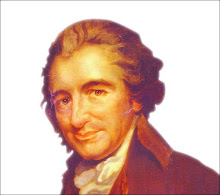A short essay on Thomas Paine recently appeared under the signature of Daniele Bolelli on the blog of the small independent publishers, the Disinformation Company. Though nicely written, the author repeats some of the most common canards -- some serious, some mere quibbles -- with respect to the scholarship around Thomas Paine. My comments and corrections are below the link to the article here:
http://www.disinfo.com/2011/12/the-filthy-little-atheist-founding-father/
Ms. Bolelli repeats the false claim that John Adams wrote the line (her paraphrase) that "without his pen, Washington’s military victories would have been in vain." The passage appears nowhere in the writings or recorded words of John Adams. It was written by the American poet and diplomat Joel Barlow and appears in a 1792 London edition of Paine's Common Sense with introduction by Barlow.
The author repeats the usual though short-sighted pro-forma "Paine participated in two revolutions."
The statement refers, of course, to the American and French Revolutions and is technically true as far as it goes. But Paine's Rights of Man and Age of Reason were the two works around which the British struggle for freedom of the press raged. Most of the historic legal controversy centered around his writings. So Paine was at the center of at least three revolutions.
Bolelli writes that after Paine published Age of Reason, "the masses hated him." Not really. Certain prominent Federalists used the Age of Reason in order to attack Paine's political ideas and Protestant ministers were expected to condemn him from pulpit and in pamphlet. But Paine's many Antifederalist allies and admirers were not fooled by any of this and the ministers themselves voiced "ALARM" that his Age of Reason was so widely read and influential, especially in schools and colleges. Well, if it was widely read and influential, then the masses couldn't very well have hated him, could they.
The author writes that Paine's works were "among the best-sellers of the 18th century." This is an understatement. No other author of the period comes even close to Paine in number of printings and sales of his works.
Bolelli repeats the perennial lament that had Paine just had the decency to die before Age of Reason, "his place among the pantheon of beloved founding fathers would have been assured." First of all, in American History the "founding fathers" are confined to members of the convention that drew up the US Constitution in 1787, the founders of the country. Paine had already left the continent in order to agitate for liberty in Britain and France. He took no part in the convention and would not be considered a "founding father" even if he died in 1792. Second, Paine's legacy is intact and as permanent as any in existence. His detractors failed.
Daniele Bolelli's essay or blog is an excerpt of a new book entitled 50 Things You're Not Supposed To Know: Religion (The Disinformation Company: 2011), evidently a self-published work? In any case, we wish the author well.
According to the company information page:
"The Disinformation Company is a dynamic, independent media company based in New York City. We are active in book publishing, film production and home video distribution, with well over 150 books and films in our catalog. We are known for working with filmmakers and authors to promote important political, social or cultural issues that are ignored by the mainstream media."
© Kenneth W. Burchell 2012, All Rights Reserved.
Subscribe to:
Post Comments (Atom)




Great post, Ken!
ReplyDeleteThe founding father argument is an interesting one; I remember a debate on it back in 2009 at my colloquium. While the term does tend to refer more specifically to the ones who drew up the Constitution, perhaps that definition should be expanded since Paine did play a very important role in the founding of the nation: not just in Common Sense and the American crisis, but in his other activities (e.g., negotiation with the Iroquois, writings on land, banks, etc.).